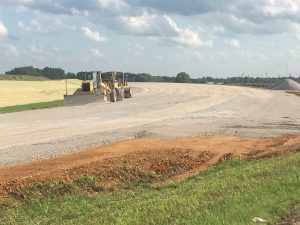News
TDOT Urges Motorists to be Mindful of Road Construction on State Highway 56
September 4, 2020
By: Dwayne Page
The Tennessee Department of Transportation advises motorists to be vigilant as construction work continues on Highway 56 from Smithville to the Warren County line.
Jones Brothers Contractors, LLC continues to install concrete box culverts and drainage structures, with ongoing bridge, grade, and utility work on the new roadway alignment. There has been no change in traffic patterns. Traffic is still using the existing highway. Motorists are advised to use caution and watch for construction equipment adjacent to the roadway. Flaggers may be present to move equipment across the roadway, unload equipment, or complete utility work. A portion of County House Road is closed to allow the contractor to complete work in that area. Motorists should follow posted signs for County House Road detour until work is complete. The contractor is also working at the intersection of South Tittsworth Road and the new alignment. Traffic will be shifted onto a diversion to allow the contractor to construct the new alignment. Motorists should use caution in this area and watch for flaggers.
TDOT opened bids last June and Jones Brothers Contractors, LLC was the low bidder on the construction project at $43,691,948 which is being done in two phases from south of state highway 288 near Magness Road to East Bryant Street in Smithville and from south of the Warren-DeKalb County line to near Magness Road in DeKalb County. A proposed third segment from near State Route 287 in Warren County to near the DeKalb County Line is not yet ready for bid letting.
The state is building largely two lanes of a proposed four lane project and maintaining traffic on the existing Highway 56 (alignment) while construction is done on the new portion.
The estimated completion date for the two phases is May 31, 2022.
The Tennessee Department of Transportation will halt all lane closure activity on interstates and state highways for the Labor Day holiday travel period. Construction crews will stop all lane closure activity beginning at noon on Friday, September 4 until 6:00 a.m. on Tuesday, September 8. This will provide maximum roadway capacity for motorists traveling during the Labor Day holiday.
“The Labor Day holiday is typically a busy travel time,” said TDOT Commissioner Clay Bright. “We want to ensure that travelers using Tennessee’s roadways during this period arrive at their destinations quickly and safely without being impeded by road construction delays.”
While lane closure activity will be stopped, workers will still be on site in many construction zones, and drivers are urged to obey posted speed limits. Drivers convicted of speeding in work zones where workers are present face a fine of $250 to $500, plus court fees and possible increased insurance premiums.
The “Hands Free Tennessee” law, which requires drivers to put down their phones and focus on the road, includes a $200 fine if the violation occurs in a work zone while workers are present.
From your desktop or mobile device, get the latest construction activity and live streaming SmartWay traffic cameras at www.TNSmartWay.com/Traffic. Travelers can also dial 511 from any land-line or cellular phone for travel information, or follow us on Twitter at www.twitter.com/TN511 for statewide travel. As always, drivers are reminded to use all motorist information tools wisely and Know Before You Go! by checking travel conditions before leaving for your destination. Drivers should never tweet, text or talk on a cell phone while behind the wheel.
Tennessee Department of Education to start reporting the number of COVID-19 cases in DeKalb Schools weekly
September 4, 2020
By: Dwayne Page
If you want to know how many active cases of COVID-19 are in the DeKalb County School District or any other system in the state that information will be available starting next week.
The Tennessee Department of Education will launch a new dashboard on Tuesday that will include the total number of active cases among students and staff broken down by school across the state.
The department will update the dashboard every Monday with the previous week’s number of new cases and will include classroom or school closures and whether students are learning in-person, remotely or a hybrid of both for each district.
“Parents and community members are working to make informed decisions, and we have determined the best path that balances informed decision making with our obligation to student privacy,” Education Commissioner Penny Schwinn said in a statement. “We believe this resource will not only help parents but will inform how COVID-19 is affecting student attendance, chronic absenteeism and overall student attainment.”
The sharing of student information is stringently protected under the Federal Education Rights and Privacy Act (FERPA) and protecting personally identifiable information of our youngest Tennesseans is critically important. To ensure protections of individual privacy, schools with fewer than 50 students will not be reported in the dashboard. For schools reporting under five positive student or employee COVID-19 cases, the school will be listed without a specific number of cases for the category.
At the district level, the dashboard will provide district-reported information on the number of new positive COVID-19 cases amongst students, the number of new positive COVID-19 cases amongst staff, and the primary operating model for schools within the district, including the number of schools conducting in-person learning, the number of schools conducting remote learning, and the number of schools utilizing a hybrid approach for instruction. In addition, the dashboard will display whether the district has adopted a critical infrastructure designation for certain workers, as well as a link to the district’s Continuous Learning Plan (CLP) which outlines how the district plans to administer remote learning.
At the school level, the dashboard will provide district-reported information on the number of new positive COVID-19 cases amongst students, number of new positive COVID-19 cases amongst staff, and whether adjustments from the district’s primary operating model have been made within the school. Students and staff listed as positive does not necessarily indicate they contracted COVID-19 at the school building.
Users will have two ways to access information:
A map view— An interactive map of the state of Tennessee will enable users to hover over their county or region and select their school to reveal more information.
And a menu view—A drop-down menu will allow users to quickly select a particular district of interest to reveal more information.
To protect individual privacy, schools with fewer than 50 students are not reported in this data. Further, for schools reporting a number that is fewer than five positive student or employee COVID-19 cases, the school will be listed without a specific number of cases for the category.
Of the state’s 147 school districts, 145 are open for the school year with the remaining two beginning their school year on September 8. The department will be working closely with districts to support their reporting and encourage them to update information on a weekly basis. Districts will receive instructions for reporting this information to the department as well as technical assistance when needed.
For access to additional resources related to reopening schools, visit the Tennessee Department of Education’s Reopening webpage: https://www.tn.gov/education/health-and-safety/update-on-coronavirus/reopening-guidance.html.
Board of Education to Re-Organize
September 3, 2020
By: Dwayne Page
The DeKalb County Board of Education will re-organize when it convenes in regular monthly session Thursday night, September 10 at 7 p.m. at the DCHS cafeteria. A work session will be held prior to the meeting at 6 p.m. Social distancing guidelines will be observed. Masks will be worn and other CDC procedures will be followed.
Each September the Board names a chairman, vice chairman, and a Tennessee Legislative Network Representative to serve for the ensuing year.
The sitting officers are Chairman Danny Parkerson, Vice Chairman Shaun Tubbs, and TLN Representative Jim Beshearse.
This will also be the first meeting for new school board members Jamie Cripps from the 5th district and Jason Miller from the 6th district.
The agenda is as follows:
*Re-organization of the Board
*School updates and or committee reports
*Personnel Report from the Director of Schools
*Any another business from the Board member that may properly come before the Board.
The consent agenda is as follows:
*Approval to utilize the electronic check signing and present signatures until there is an update
*Approval of the Contract for Audit of Activity and Cafeteria Funds for the Fiscal Year ending June 30, 2020
*Consider and act on 2020-21 budget amendments to the Federal Programs Consolidated Funding Applications.
ESSER Cares Grant budget amendment #1
« First ‹ Previous 1 1345 1435 1443 1444 14451446 1447 1455 1545 2575 Next › Last »










